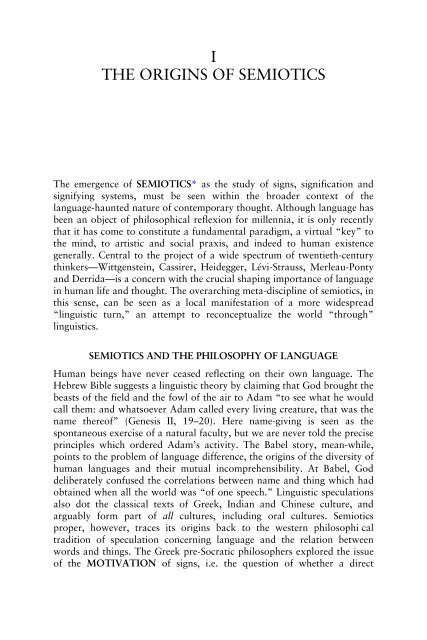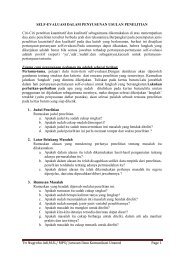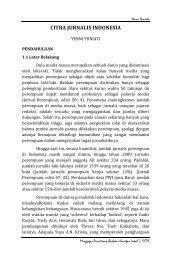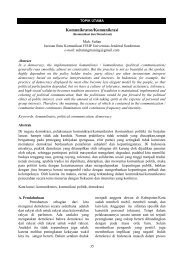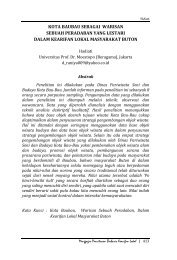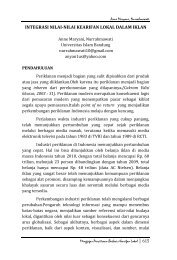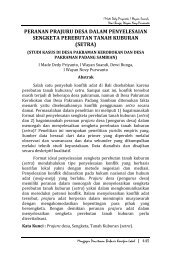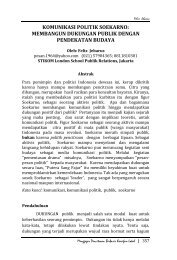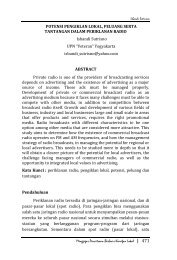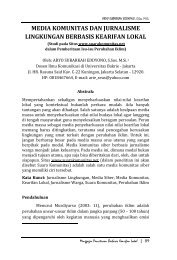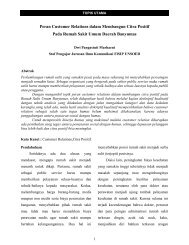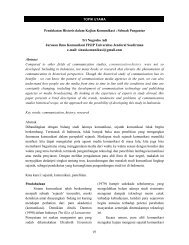- Page 2 and 3: NEW VOCABULARIES IN FILM SEMIOTICS
- Page 4 and 5: NEW VOCABULARIES IN FILM SEMIOTICS
- Page 6 and 7: To Christian Metz
- Page 8 and 9: Beyond Saussure 67 Part III Film-na
- Page 10 and 11: CONTRIBUTORS Robert Stam is Profess
- Page 12 and 13: ecome familiar, while the concepts,
- Page 14 and 15: “identification” leads easily t
- Page 18 and 19: 2 THE ORIGINS OF SEMIOTICS inherent
- Page 20 and 21: 4 THE ORIGINS OF SEMIOTICS Barthes
- Page 22 and 23: 6 THE ORIGINS OF SEMIOTICS Dynamic
- Page 24 and 25: 8 THE ORIGINS OF SEMIOTICS the sync
- Page 26 and 27: 10 THE ORIGINS OF SEMIOTICS close?
- Page 28 and 29: 12 THE ORIGINS OF SEMIOTICS battleg
- Page 30 and 31: 14 THE ORIGINS OF SEMIOTICS the dis
- Page 32 and 33: 16 THE ORIGINS OF SEMIOTICS languag
- Page 34 and 35: 18 THE ORIGINS OF SEMIOTICS Realist
- Page 36 and 37: 20 THE ORIGINS OF SEMIOTICS Propp
- Page 38 and 39: 22 THE ORIGINS OF SEMIOTICS members
- Page 40 and 41: 24 THE ORIGINS OF SEMIOTICS which m
- Page 42 and 43: 26 THE ORIGINS OF SEMIOTICS The Sau
- Page 44 and 45: 28 THE ORIGINS OF SEMIOTICS NOTES 1
- Page 46 and 47: 30 CINE-SEMIOLOGY Spottiswoode’s
- Page 48 and 49: 32 CINE-SEMIOLOGY the psychology of
- Page 50 and 51: 34 CINE-SEMIOLOGY semiology corresp
- Page 52 and 53: 36 CINE-SEMIOLOGY emphasis on two-w
- Page 54 and 55: 38 CINE-SEMIOLOGY is less open to i
- Page 56 and 57: 40 CINE-SEMIOLOGY the diegetic in h
- Page 58 and 59: 42 CINE-SEMIOLOGY (3) the BRACKET S
- Page 60 and 61: 44 CINE-SEMIOLOGY approach seems to
- Page 62 and 63: 46 CINE-SEMIOLOGY The ALTERNATING S
- Page 64 and 65: 48 CINE-SEMIOLOGY procedures. Apart
- Page 66 and 67:
50 CINE-SEMIOLOGY CODES AND SUBCODE
- Page 68 and 69:
52 CINE-SEMIOLOGY TEXTUAL SYSTEM It
- Page 70 and 71:
54 CINE-SEMIOLOGY that work from a
- Page 72 and 73:
56 CINE-SEMIOLOGY Kuntzel focussed
- Page 74 and 75:
58 CINE-SEMIOLOGY progressive and c
- Page 76 and 77:
60 CINE-SEMIOLOGY it functions as a
- Page 78 and 79:
62 CINE-SEMIOLOGY order; the voice,
- Page 80 and 81:
64 CINE-SEMIOLOGY illustrates its c
- Page 82 and 83:
66 CINE-SEMIOLOGY sequence of Stran
- Page 84 and 85:
68 CINE-SEMIOLOGY There have also b
- Page 86 and 87:
III FILM-NARRATOLOGY THE SEMIOTICS
- Page 88 and 89:
72 FILM-NARRATOLOGY FILM AS A NARRA
- Page 90 and 91:
74 FILM-NARRATOLOGY one another—t
- Page 92 and 93:
76 FILM-NARRATOLOGY film to verse
- Page 94 and 95:
78 FILM-NARRATOLOGY deep meaning wa
- Page 96 and 97:
80 FILM-NARRATOLOGY distant); and c
- Page 98 and 99:
82 FILM-NARRATOLOGY is the notion o
- Page 100 and 101:
84 FILM-NARRATOLOGY process is foun
- Page 102 and 103:
86 FILM-NARRATOLOGY One of the firs
- Page 104 and 105:
88 FILM-NARRATOLOGY Another influen
- Page 106 and 107:
90 FILM-NARRATOLOGY in the Lake, wh
- Page 108 and 109:
92 FILM-NARRATOLOGY rather than a s
- Page 110 and 111:
94 FILM-NARRATOLOGY or to the conte
- Page 112 and 113:
96 FILM-NARRATOLOGY and ideological
- Page 114 and 115:
98 FILM-NARRATOLOGY récit, or narr
- Page 116 and 117:
100 FILM-NARRATOLOGY IMAGE-MAKER; B
- Page 118 and 119:
102 FILM-NARRATOLOGY although some
- Page 120 and 121:
104 FILM-NARRATOLOGY narrator’s k
- Page 122 and 123:
106 FILM-NARRATOLOGY be understood
- Page 124 and 125:
108 FILM-NARRATOLOGY descriptive sh
- Page 126 and 127:
110 FILM-NARRATOLOGY systematic res
- Page 128 and 129:
112 FILM-NARRATOLOGY Other literary
- Page 130 and 131:
114 FILM-NARRATOLOGY is through a s
- Page 132 and 133:
116 FILM-NARRATOLOGY text: “films
- Page 134 and 135:
118 FILM-NARRATOLOGY The “unipunc
- Page 136 and 137:
120 FILM-NARRATOLOGY the impersonal
- Page 138 and 139:
122 FILM-NARRATOLOGY The opposite r
- Page 140 and 141:
124 FILM-NARRATOLOGY appear that th
- Page 142 and 143:
126 PSYCHOANALYSIS notion of self a
- Page 144 and 145:
128 PSYCHOANALYSIS The unconscious,
- Page 146 and 147:
130 PSYCHOANALYSIS in the simplest
- Page 148 and 149:
132 PSYCHOANALYSIS child is divided
- Page 150 and 151:
134 PSYCHOANALYSIS culture’s rule
- Page 152 and 153:
136 PSYCHOANALYSIS Second, as the o
- Page 154 and 155:
138 PSYCHOANALYSIS by impulses whic
- Page 156 and 157:
140 PSYCHOANALYSIS (Rose 1986:72) H
- Page 158 and 159:
142 PSYCHOANALYSIS primary text of
- Page 160 and 161:
144 PSYCHOANALYSIS and which may be
- Page 162 and 163:
146 PSYCHOANALYSIS libidinal/ eroti
- Page 164 and 165:
148 PSYCHOANALYSIS and positing the
- Page 166 and 167:
150 PSYCHOANALYSIS achieve this amb
- Page 168 and 169:
152 PSYCHOANALYSIS its totality (as
- Page 170 and 171:
154 PSYCHOANALYSIS This type of ide
- Page 172 and 173:
156 PSYCHOANALYSIS A film image (so
- Page 174 and 175:
158 PSYCHOANALYSIS incorporating a
- Page 176 and 177:
160 PSYCHOANALYSIS double movement:
- Page 178 and 179:
162 PSYCHOANALYSIS seems to be narr
- Page 180 and 181:
164 PSYCHOANALYSIS indicating that
- Page 182 and 183:
166 PSYCHOANALYSIS the individual;
- Page 184 and 185:
168 PSYCHOANALYSIS better than the
- Page 186 and 187:
170 PSYCHOANALYSIS of glances: (1)
- Page 188 and 189:
172 PSYCHOANALYSIS concept meant to
- Page 190 and 191:
174 PSYCHOANALYSIS cinematic scopic
- Page 192 and 193:
176 PSYCHOANALYSIS subject: ‘what
- Page 194 and 195:
178 PSYCHOANALYSIS of a passive (fe
- Page 196 and 197:
180 PSYCHOANALYSIS when one explore
- Page 198 and 199:
182 PSYCHOANALYSIS resurfaces here)
- Page 200 and 201:
184 PSYCHOANALYSIS effort to define
- Page 202 and 203:
186 PSYCHOANALYSIS analysis, the ci
- Page 204 and 205:
V FROM REALISM TO INTERTEXTUALITY A
- Page 206 and 207:
190 CINEMATIC REALISM photographic
- Page 208 and 209:
192 CINEMATIC REALISM the concept o
- Page 210 and 211:
194 CINEMATIC REALISM CINEMATIC ECR
- Page 212 and 213:
196 CINEMATIC REALISM the corollary
- Page 214 and 215:
198 CINEMATIC REALISM meaning, maki
- Page 216 and 217:
200 CINEMATIC REALISM (courtesy, fr
- Page 218 and 219:
202 CINEMATIC REALISM 1981:292). Th
- Page 220 and 221:
204 CINEMATIC REALISM (Although Bre
- Page 222 and 223:
206 CINEMATIC REALISM everyday live
- Page 224 and 225:
208 CINEMATIC REALISM both producer
- Page 226 and 227:
210 CINEMATIC REALISM sociologistic
- Page 228 and 229:
212 CINEMATIC REALISM accessory mes
- Page 230 and 231:
214 CINEMATIC REALISM Dublin. Both
- Page 232 and 233:
216 CINEMATIC REALISM analyzing the
- Page 234 and 235:
218 CINEMATIC REALISM school, the m
- Page 236 and 237:
220 CINEMATIC REALISM spectator, wh
- Page 238 and 239:
222 CINEMATIC REALISM and the “wo
- Page 240 and 241:
224 CINEMATIC REALISM which lies on
- Page 242 and 243:
BIBLIOGRAPHY Adams, Parveen (1978)
- Page 244 and 245:
228 BIBLIOGRAPHY Black, David Alan
- Page 246 and 247:
230 BIBLIOGRAPHY —(1989) Cinema 2
- Page 248 and 249:
232 BIBLIOGRAPHY Greimas, Algirdas
- Page 250 and 251:
234 BIBLIOGRAPHY Lentricchia, Frank
- Page 252 and 253:
236 BIBLIOGRAPHY Plato (1963) The R
- Page 254 and 255:
238 BIBLIOGRAPHY Xavier, Ismail (19
- Page 256 and 257:
240 INDEX classic realist text 192
- Page 258 and 259:
242 INDEX history/discourse (story)
- Page 260 and 261:
244 INDEX pluricodic medium (Metz)
- Page 262:
246 INDEX vococentrism (Chion) 62 v


